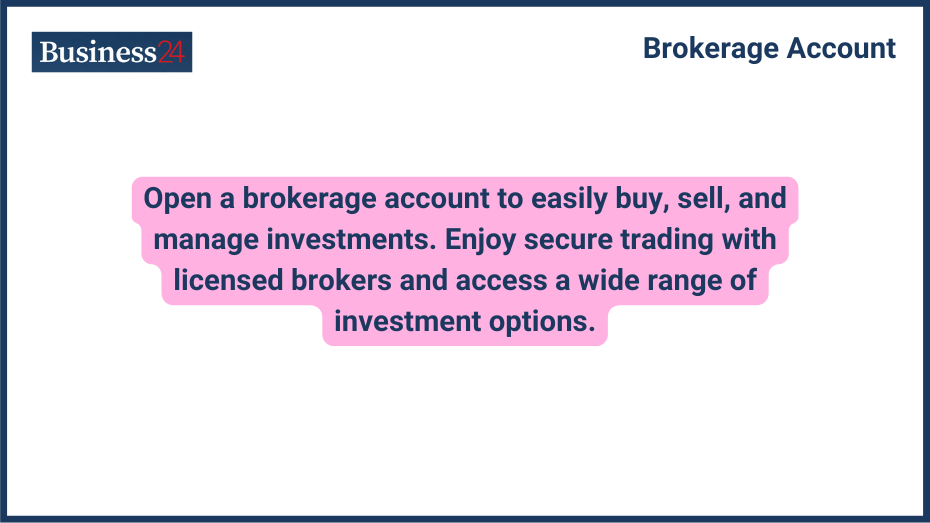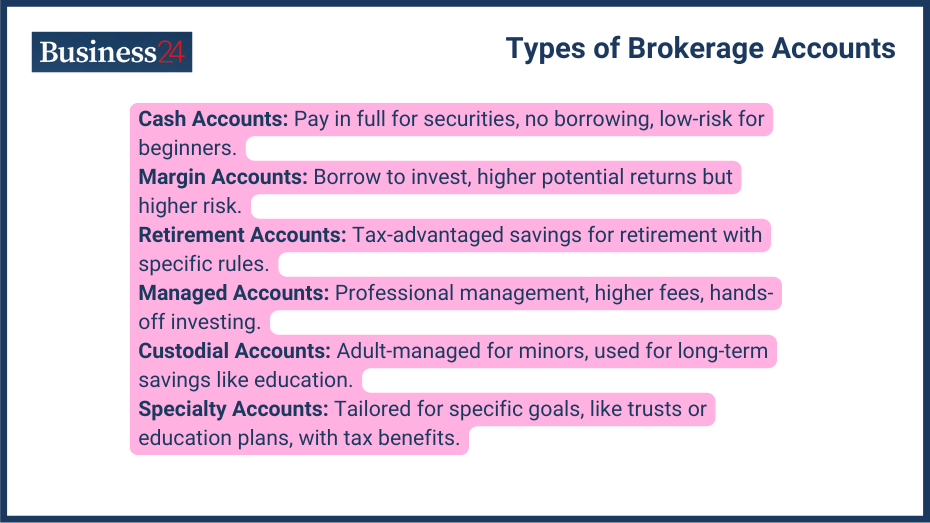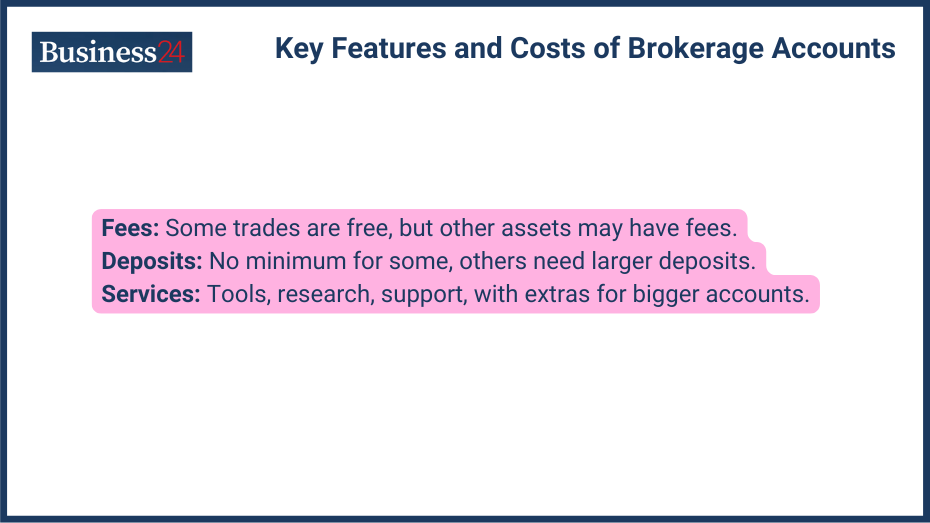
Open a brokerage account to easily buy, sell, and manage investments. Enjoy secure trading with licensed brokers and access a wide range of investment options.
The most important thing you need for trading or investing after the funds is a brokerage account. Without a brokerage account, you cannot operate in any market. A brokerage account is a financial account that allows individuals to buy, sell, and hold securities like stocks, bonds, mutual funds, and exchange-traded funds (ETFs). It is a gateway to the investment market, allowing individuals to grow their wealth over time.
The main purpose of a brokerage account is to facilitate access to the stock market and other financial markets for investing and wealth building. Brokerage accounts are essential for investing in various financial instruments. They offer a secure and convenient way to manage your investments and potentially earn significant returns. By understanding the different types of brokerage accounts and their features, you can make informed decisions about investing your money and achieving your financial goals.
Types of Brokerage Accounts

There are different types of brokerage accounts available in the market, here we will explain some of the common brokerage accounts:
- Cash Accounts: Cash accounts require investors to pay the full amount for securities at the time of purchase. No borrowing or leverage is involved, meaning transactions are funded solely by available cash in the account.
Cash accounts are low-risk as they don’t allow for margin borrowing, making them suitable for new investors who want a straightforward way to invest. They also help avoid the risk of accruing debt and interest from leveraging. - Margin Accounts: Margin accounts allow investors to borrow funds from the broker to purchase securities, using the assets in the account as collateral. This increases the investor’s purchasing power but also introduces the potential for larger gains or losses.
The main benefit is the ability to leverage investments for potentially higher returns. However, the downside includes interest charges on borrowed funds and the risk of losing more than the initial investment if trades do not perform as expected. - Retirement Accounts: Retirement accounts, such as IRAs and 401(k)s, are tax-advantaged investment accounts designed to help individuals save for retirement. Contributions are often tax-deferred, and in some cases, withdrawals in retirement are tax-free.
Unlike regular brokerage accounts, retirement accounts have specific rules regarding contributions, withdrawals, and tax treatment. They provide long-term tax benefits, but early withdrawals may incur penalties. - Managed Accounts: In managed accounts, brokers or financial advisors handle investment decisions on behalf of the account holder, tailoring the portfolio to meet the client’s financial goals and risk tolerance.
Managed accounts offer personalized service but typically come with higher fees due to the active involvement of professionals. The advantage is that investors get professional guidance, which can be helpful for those who prefer a hands-off approach. - Custodial Accounts: Custodial accounts are investment accounts managed by an adult on behalf of a minor until they reach legal adulthood. Funds are irrevocably transferred to the child and can be used for education or other purposes.
These accounts help parents or guardians save for a child’s future, offering a tax-advantaged way to build wealth. They are often used for long-term goals such as education funding. - Specialty Accounts: Specialty accounts include trust accounts, 529 education savings plans, and other accounts designed for specific financial purposes. These accounts often come with unique tax benefits or legal protections.
For instance, 529 accounts are tax-advantaged savings plans for education expenses, while trust accounts manage and distribute assets according to specific legal directives.
Key Features and Costs of Brokerage Accounts

Commission and Fee Structures
Brokerage firms typically charge fees for executing trades, which can be commission fees or a flat rate per transaction. Some brokers have shifted to zero-commission trading for certain assets like stocks and ETFs, though fees may still apply for mutual funds, bonds, or options.
Additionally, managed accounts may incur advisory fees to cover professional management services, usually a percentage of the account’s value. Beyond trade commissions, brokers might charge for services such as transferring funds, account maintenance, or providing premium research tools.
Minimum Deposit Requirements
Minimum deposit requirements can vary widely across brokers and account types. Some online brokers allow investors to open accounts with no minimum deposit, making it easy for beginners to start with even small amounts of capital. Other brokers, especially those offering managed or specialty accounts, may require minimum deposits ranging from a few hundred to several thousand dollars.
Investors should be mindful of these requirements when selecting a brokerage account. If the required minimum deposit is too high, it could delay the ability to start investing. Conversely, meeting the minimum may open access to more premium services or reduced fees.
Account Services
Most brokers offer various account services to enhance the investment experience, including research tools, real-time market data, and access to professional analysis. Some provide educational resources like webinars, tutorials, and financial planning guides to help novice investors understand market trends and make informed decisions. Advanced traders may have access to charting software, trading simulators, and portfolio management tools to aid decision-making.
Customer support is another key service provided by brokers. Many firms offer 24/7 customer service through phone, email, or live chat to assist clients with technical issues or account management questions. Higher-end brokers may even provide dedicated account managers or financial advisors for more personalized support.
Tax Implications of Brokerage Accounts
There are some tax implications of brokerage accounts that you should as a brokerage account holder:
- Differences between Taxable and Tax-Advantaged Accounts: The primary distinction between taxable and tax-advantaged brokerage accounts is how tax authorities treat them.
Taxable accounts, like regular brokerage accounts, are subject to yearly taxes on dividends, interest, and capital gains. On the other hand, tax-advantaged accounts, such as Individual Retirement Accounts (IRAs) and 401(k)s, offer special tax benefits that can help reduce or defer taxes.
For example, contributions to a traditional IRA are typically tax-deductible, and the account grows tax-deferred, meaning investors don’t pay taxes until they withdraw funds in retirement. Roth IRAs, by contrast, are funded with after-tax dollars, but qualified withdrawals are tax-free, making them an appealing choice for long-term growth.
- How capital gains, dividends, and interest are taxed in brokerage accounts: In a taxable brokerage account, the tax treatment of gains and earnings varies depending on the type of income. Capital gains are taxed at different rates depending on how long the investor holds the asset. Short-term capital gains from assets held for one year or less are taxed at the investor’s regular income tax rate, which could be as high as 37%. Long-term capital gains from assets held for more than a year benefit from lower tax rates, typically ranging from 0% to 20%, depending on the investor’s income bracket.
Dividends are taxed differently based on whether they are qualified or non-qualified. Qualified dividends from U.S. corporations or certain foreign entities that meet specific IRS requirements are taxed at the lower long-term capital gains rate. Non-qualified dividends, however, are taxed as ordinary income. Interest income from bonds or savings accounts is usually taxed as regular income at the investor’s marginal tax rate.
- Importance of choosing accounts based on tax planning: Investors with long-term goals, such as retirement, may benefit from using tax-advantaged accounts like IRAs or 401(k)s, where contributions grow tax-deferred or tax-free. By deferring taxes, these accounts allow for potentially higher compounding of returns over time.
For investors looking to meet short—to medium-term goals, taxable accounts may be more appropriate, as they offer greater flexibility in terms of withdrawals. However, it’s important to manage investments in these accounts to minimize the tax burden, for example, by holding onto assets long enough to qualify for the lower long-term capital gains tax rates.
Choosing the Right Brokerage Account
- Factors to Consider: Risk Tolerance, Investment Goals, Time Horizon
Assessing personal factors such as risk tolerance, investment goals, and time horizon is essential when choosing a brokerage account. Investors with a lower risk tolerance may prefer more conservative accounts, such as cash or managed accounts, emphasizing stable, long-term growth. Conversely, risk-tolerant investors looking for higher returns might opt for margin accounts, which allow leveraged trading but carry the potential for higher losses.
Investment goals are also crucial. For instance, those saving for retirement may prioritize tax-advantaged accounts, while individuals seeking short-term growth or liquidity might lean toward taxable accounts.
- Costs, Flexibility, and Liquidity of Different Account Types
Each type of brokerage account comes with distinct costs, flexibility, and liquidity. Managed accounts, for example, offer personalized portfolio management but typically charge higher fees. In contrast, self-directed accounts, such as cash accounts, have lower costs but require investors to manage their investments independently.
Flexibility is another important consideration; certain accounts, like IRAs, restrict when funds can be withdrawn without penalty, while taxable accounts allow greater access to funds at any time.
Accounts that invest primarily in stocks and ETFs offer high liquidity, while those focused on long-term investments, like bonds or real estate, may be less liquid. Investors should choose accounts that match their need for access to funds and their willingness to pay for professional services.
Evaluating Broker Offerings (Platform, Fees, Services)
Before choosing a broker, investors should carefully evaluate the platform’s features, fee structures, and available services. Some brokers provide robust trading platforms with advanced research tools, real-time data, and detailed market analysis, which can be highly valuable for active traders. Others may focus on a simplified user experience, offering basic trading functionalities at a lower cost, which may suit beginner investors.
Additionally, brokers’ fee structures can vary widely. Some charge a flat fee per trade, while others may offer commission-free trading but impose higher fees for account maintenance or premium services. Evaluating these factors with the services provided—such as educational resources, customer support, and access to professional advisors—can help investors find a brokerage that best suits their financial objectives and trading style.
Conclusion
Understanding the various types of brokerage accounts is essential for anyone looking to invest, as each type offers unique advantages and tax implications. By familiarizing themselves with different accounts’ features, costs, and benefits, investors can make informed decisions that align with their financial goals.
Choosing the right brokerage account can significantly impact one’s ability to achieve personal financial objectives. Investors can maximize returns by selecting an account that matches their investment horizon, risk tolerance, and tax considerations while minimizing risks and costs. Being thoughtful about these decisions lays the foundation for long-term financial success.
Disclaimer
eToro is a multi-asset platform which offers both investing in stocks and cryptoassets, as well as trading CFDs.
Please note that CFDs are complex instruments and come with a high risk of losing money rapidly due to leverage. 51% of retail investor accounts lose money when trading CFDs with this provider. You should consider whether you understand how CFDs work, and whether you can afford to take the high risk of losing your money
This communication is intended for information and educational purposes only and should not be considered investment advice or investment recommendation. Past performance is not an indication of future results.
Copy Trading does not amount to investment advice. The value of your investments may go up or down. Your capital is at risk.
Don’t invest unless you’re prepared to lose all the money you invest. This is a high-risk investment and you should not expect to be protected if something goes wrong. Take 2 mins to learn more
eToro USA LLC does not offer CFDs and makes no representation and assumes no liability as to the accuracy or completeness of the content of this publication, which has been prepared by our partner utilizing publicly available non-entity specific information about eToro.
